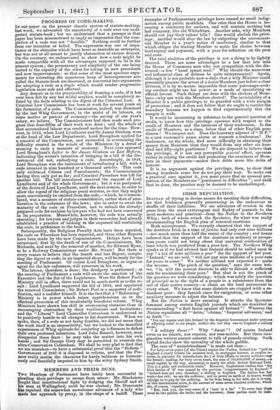MEMBERS AND THEIR DUNS.
Two Members of Parliament have lately been successful in pleading their privilege to escape from arrest : Mr. Blackstone fought that constitutional fight by dodging the Sheriff and all his men at Wallingford, until he was elected ; Mr. Duncombe has repulsed the somewhat unwelcome advances of a lady who made her approach by proxy, in the shape of a bailiff. These examples of Parliamentary privilege have caused no small indig- nation among public moralists. One cries that the House is be- coming a sanctuary for outlaws, and will contain nothing but bad company, like old Whitefriars. Another asks why Members should not pay their tailors' bills ? One would abolish the privi- lege-' another would alter the law by subjecting the uncommer- cial Member to a year's notice of insolvency, similar to that which obliges the trading Member to make his choice between bankruptcy and payment, with a year for reflection on the pros and cons.
The total abolition of the privilege is not a thing to be lightly decreed. There are some advantages in a law that lets into the House of Commons men who can sympathize with the dis- tressed—a few "hand ignari mali." Why should the numerous and influential class of debtors be quite unrepresented? Again, although it is not probable now-a-days that a wily Minister could personally procure the arrest of a dozen Members just before a close division, it is by no means impossible that some patronage-seek- ing creditor might use his power as a mode of speculating on official favour. Such things are done with the electors of Mem- bers—why not with the Members elected? The inviolability of a Member is a public privilege, to be guarded with a wide margin of protection ; and it does not follow that we ought to restrict the boundary because we happen to find experimentally that the margin is wide. It would be interesting in reference to the general question of credit, to know how this privilege operates with respect to the credit of Members and the interests of their tradesmen. Is the credit of Members, as a class below that of other English gen- tlemen? We suspect not. Does the honorary adjunct of" P." to a new customer's name alarm or reassure a tradesman? Do tradesmen, on the whole, find more difficulty in obtaining their money from Members than they would from any other six hun- dred and fifty-eight gentlemen We are disposed to believe that the privilege, if it has any perceptible general effect, operates rather in raising the credit and promoting the exactness of Mem- bers in their payments—makes their debts more like debts of honour.
It is no argument against the privilege, then, to show that among hundreds some few do not pay their way. To make out a practical case against it, you must prove that an unusual pro- portion of the Members are "gentlemen in difficulties" ; and until that be done, the practice may be deemed to be unchallenged.


























 Previous page
Previous page